- Home
- Amin Maalouf
The Disoriented Page 12
The Disoriented Read online
Page 12
From the first, the court case was obviously the chink in his armour. And it was through this chink that misfortune and shame found a path.
It’s true that, in the meantime, there had been a war. Without it, time might have trickled past with the same Ottoman slowness, and a village dispute might have remained no more than a village dispute.
Instead, from the beginning of the war, the lawsuit became entangled, if I can put it this way, with broader concerns. Mourad’s adversaries armed themselves, they allied themselves to a political movement that was in the ascendant and, one day, taking advantage of the chaos raging throughout the country, they came and occupied the old house.
The leader of the clan was a young man, a twenty-five-year-old hothead with a law degree, named Chamel, if memory serves. He called himself “the Jaguar,” not a reference to the animal, but to the car he had bought—or perhaps “requisitioned.”
As you can easily imagine, Mourad went mad. He told anyone who would listen that he would kill the little bastard with his bare hands. As far as he was concerned, this was the end of the world. There could be no question of taking a step back, of putting things in perspective, of buying time. I talked to him on the phone several times during this period, to try to calm him down, to dissuade him from doing something stupid. A waste of time. When he saw that I was insistent, he simply said—with the pig-headedness he was sometimes capable of—that it was none of my business, that it was his house, his inheritance, his family property, and that I was nothing but an emigrant, cut off from the realities of the country. I stopped arguing. I told him I wouldn’t bother him anymore.
What Mourad planned to do to take back his house, I found out—
Adam was interrupted by a call on his mobile phone. It was Sémiramis, calling from the same old house.
“The funeral is over, but there are still a lot of people here. Tania is still shaking hands with people, and I’m doing much the same. People see me standing next to her and they assume I’m one of the family. I’ve only just managed to slip away to call you. Right now, I’m leaning on the balustrade, in the corner of the terrace where the two of us used to sit.”
“Maybe I should have gone with you, after all …”
“Don’t feel any regrets, Adam! You would never have been able to stomach the whole thing. The cortege, the ceremony, the speeches, the lies, the endless line of people waiting to offer their condolences, the burial in the noonday sun … It was hell! I got here more than five hours ago, and I’m still not done. When I arrived, I thought, I’ll kiss Tania and slip away at the first opportunity. But the minute she saw me, she grabbed my arm, and she hasn’t let go since. I suppose I remind her of the happiest time in her life. The period just after she met Mourad, when our little group of friends was passionate, naïve, united. Back when we used to have dinner at Le Code Civil. When all dreams were permitted … Obviously, she’s only latched on to me because you and the others aren’t here. In fact, that’s why I’m calling you. You were right to avoid the funeral, but it would be good if you could make a brief appearance.”
“Now?”
“No, not right now, the house is still heaving. Come around eight, eight thirty, most people will have left. Tania would be so happy to see you.”
“Don’t you think she’ll be exhausted after such a long day?”
“Of course, she’ll be exhausted, shattered. She already is. But she would still feel better for seeing you.”
“I’ll think about it.”
“No, don’t think about it. Francis, my maître d’hôtel, has a brother with a car who works for us as a chauffeur sometimes when one of our guests needs to go somewhere. I’ll call him, his name is Kiwan, he’ll pick you up. Shall we say eight o’clock?”
It wasn’t really a question. Adam’s only response was a long sigh, of surrender.
He immediately went back to his computer:
While I have been writing this long letter to you, Naïm, my friend Sémi, who is at Mourad’s funeral, called me—from the terrace, yes, “our” terrace—to ask me to go and spend a little time with Tania tonight. A car is coming to pick me up.
It feels strange, telling you about the lawsuit at the very moment when I am about to set foot in the old house for the first time in a quarter of a century, when our poor friend has just been buried … But I am leaving the sad circumstances to one side so I can carry on with my story and send it before I leave.
Exactly what Mourad planned to do to get the house back, I only learned when it was too late.
At the time, there was almost no semblance of central government in the country. In certain districts of the capital and in the mountains, we had seen the emergence of local caïds, many of whom adopted ironic noms de guerre; aside from the Jaguar, who I have mentioned, I remember hearing about warlords calling themselves “Rambo,” “Zorro,” “Killer,” “Terminator,” and even “Klashenn,” an affectionate diminutive of Kalashnikov. There were dozens of these tinpot leaders at the time, but very few of them had any influence beyond their district, their clan, or their village. There was, however, someone of a very different calibre, a troubling individual dubbed the “High Commissioner”—you probably heard of him during his fifteen minutes of fame […]
Such a sobriquet, inherited from the colonial period, suggested some link to a foreign power, and this man had indeed managed to make himself useful, sometimes even indispensable, to neighbouring countries that, at some point or other, had sent troops into our unfortunate country.
I’m not telling you anything when I say that, every time our territory was invaded, there were some among out compatriots who were prepared to collaborate with the invaders, clear a path for them, offer to be of service and attempt to use them against local rivals. You’ll probably say that, in any shattered country, there are always traitors and collaborators. And you’re right. But it seems to me that in our country, we are too ready to do a deal with the conqueror of the moment as though there were nothing reprehensible about it.
The excuse has always been “the eye cannot withstand the drill,” to quote the lurid proverb. The chief preoccupation of the various communities in this country has always been survival, survival at any cost, something that has been used to excuse every shameful compromise. Having decided to leave, to seek refuge, I am not in a position to lecture those who stayed. But that does not stop me feeling outraged, and sometimes disgusted. As I assume you do …
The fact remains that, when it came to the art of collaboration, the aforementioned “High Commissioner” was a past master. He had managed to serve three successive invaders, persuading each that he was a loyal ally, in return for power and influence.
Since your academic background is much the same as mine, you can easily guess what words come to my mind when I talk about such people … And you will understand my fury the day I discovered that Mourad had paid a visit to our local “quisling” to ask him to take action against the people who had occupied his house.
The “High Commissioner” was delighted. Here was a man who spent his time stirring up local factions so that he could play mediator, and there was a respected local figure, the scion of one of the great mountain families, coming to him on his own initiative to ask for help in recovering his property. He said that he was happy and honoured to welcome Mourad, and promised to settle the matter swiftly. “If there’s anything I can do in return …” our friend tactlessly suggested, not knowing whether the man wanted payment for his services. The honourable rogue took offence. What? Taking money for dispensing justice? For helping a respectable citizen to recover his property? Out of the question.
According to the ancient wisdom of the Levant, if a man who does you a service does not expect money, it is because he expects to recover his costs in some other way. Mourad knew this, but the fate of his family home blinded him to the point of losing his judgement.
On the da
y following the meeting, a platoon from the occupying army stormed the house, firing in all directions. Taken unawares, the village militiamen surrendered almost without a fight. But the attackers were not content simply to disarm them and throw them out. They stood the Jaguar up against a wall and shot him “as an example.” Then the “collaborator in chief” called Mourad and triumphantly announced that his house had been liberated, that he and his family could move back there, and that they need fear no reprisals, since his enemies had been taught a lesson they would not forget.
Our friend swore to me that it never occurred to him for a minute that anyone would be killed, and I’m prepared to give him the benefit of the doubt, even if, in asking such a person to intervene, he should have assumed there might be bloodshed. He also insisted that only later did he find out how the Jaguar had died. Initially, he assumed the Jaguar had been armed and was gunned down during the attack; this in itself would have been serious, and more than enough for the Znoud to seek revenge. But to have been shot in cold blood in front of his brothers and his cousins was a tragedy of much greater magnitude. Man-to-man combat implies a certain degree of mutual respect, even at the moment of killing; an execution, on the other hand, is intended both to kill and to humiliate.
At the Jaguar’s funeral the women of the clan wore red, to signify that they would not wear mourning until their hero had been avenged.
And so Mourad moved back into his sprawling, ancient mansion, but something in the atmosphere of the village, and something in his mind, had been permanently tainted. Much as he protested that he had not been the first to resort to violence, that he had only retaken by force what had been taken from him by force, he felt guilty, and so he was. Guilty of calling on an armed force external to the village—and, incidentally, to the country, but that was almost less serious; and responsible for the heinous execution, though he had neither ordered it nor wished it. He assured me that he had vehemently said as much to the High Commissioner, who had squarely placed the blame on a number of hotheads whom he promised to discipline. And he further committed himself to protecting Mourad and his property day and night.
This gesture of “reparation” was probably what had motivated the execution of the Jaguar, and indeed the whole operation. The aim of the local quisling had been to make our friend dependant on him for his safety, and hence keep him under his thumb. I supposed that Mourad must have realized this, but it was too late. The fury of the opposing clan was not going to be quickly appeased, and he could no longer risk falling out with his protector.
Now dependent on the High Commissioner for his safety, and even his survival, Mourad gradually came to seem more like his right-hand man, his faithful retainer. Given the circumstances I’ve just described, you might say that our friend had no choice. Maybe. Although in my opinion, he would have done better to choose exile over living in the country on such terms. But that’s another matter … Back when we were still talking to each other, Mourad never said: “I don’t have a choice.” He commended his protector, praised his intelligence, his “sincerity,” assured me that he thought “exactly like us’” and insisted that I come and meet him. My offensive comments—what do you mean “like us”? and what exactly is this “sincerity”?—eventually exasperated him, and our communications became less frequent before stopping completely.
When, one day, it was decided to form a government of reconciliation including delegates from the major warlords, it was our friend that that High Commissioner chose to represent him. Yes, it was by this glorious route that Mourad became a minister, and remained one for many years, managing to survive from one government to the next, frequently changing his portfolio: Public Works, Health, Telecommunications, Defence …
The laws of society are not like the laws of gravity, sometimes it is possible to fall upwards rather than down. The political ascent of our friend was the direct result of the offence he had committed. Later, by force of circumstance, he would commit many more … Principles are ropes, they are moorings; break them and you are free, but like a huge helium-filled balloon that soars, soars, soars, seeming to rise towards the sky, when really it is rising towards nothingness. Our friend soared, soared, soared; he became powerful, famous, and most of all rich, outrageously rich.
Although I have lived now for decades in France, one of the last bastions of egalitarian morality, believe me, I have not developed any hostility towards the rich. A number of my friends have become rich in recent years, as you know, and it has not changed my attitude to them one way or another. But the day I found out Mourad had bought a struggling bank for several hundred million dollars, I was deeply shocked. Because I know exactly what his financial position was like before he became a minister. We were very close, he wasn’t secretive, and I had a very good idea of what he owned. He wasn’t poor, but it was a struggle to maintain the house, in fact he had to sell off some land to have the roof repaired because the tiles were in poor condition. By what miracle could he possibly have saved enough to buy a bank, after a few years in government? There is no need to conduct an exhaustive investigation to know that it was dirty money. That, at best, it came from bribes and backhanders. And that’s the least degrading hypothesis. If you want to know what I really believe, I think that, in business and in politics, our former friend was the public face of the sinister High Commissioner, and that he took a share of the profits from his multiple schemes: extortion, pillaging, drug trafficking, money laundering—but what do I know?
Unfortunately, our compatriots are complacent, hopelessly complacent when it comes to such practices. Because that’s the way things have always been, they say. In fact, they admire the cunning of those who “make it,” regardless of the means they adopt. I almost think the local motto is, to paraphrase a proverb about Rome: “In a cutthroat world, do as the cutthroats do.”
In our mother tongue, to say “nouveaux riches,” don’t we say “war wealthy?”
By extension, we should talk about “war personalities,” “war politicians,” and “war celebrities.” Not content to simply bring out our worst instincts, war moulds them, it shapes them such that people who might have been kind and friendly if their society hadn’t imploded become traffickers, looters, kidnappers, killers, butchers. He and I dreamed of a different society, a different world. I don’t forgive him anything. That he was my best friend is in no way, to my mind, a mitigating circumstance. On the contrary, it is an aggravating circumstance. The crimes of a friend sully and insult you; it is your duty to judge them mercilessly.
I did not speak to Mourad again—until the night before he died.
Is it possible to obliterate years of friendship with the stroke of a pen? Yes, that is exactly what I did. With the stroke of a pen, I obliterated our years of friendship. When someone mentioned Mourad, I would coldly say, “He’s a former friend.” I no longer spoke to him, I barely thought about him. Until Tania called me, last Friday, to tell me that he was dying.
But I’ve said too much, that’s enough, I’ll stop now. I will not revile his memory any more on the day of his funeral. I would like to say one more thing, specifically to you, something I have often thought when thinking about our old friend: you and I were forced to leave the Levant to try and keep our hands clean. We have no reason to be ashamed, but it would be absurd to advocate exile as the sole solution to moral dilemmas. Some day or other, a solution will have to be found for those who remain—if one exists, something about which I am not entirely sure …
But it’s getting late, I have to go.
Much love,
Adam
He pressed Send. According to his watch, it was already 8:40 p.m. He quickly put on a tie then raced down to the waiting car.
-
4
It was about nine thirty in the evening when Adam arrived at the home of the deceased. Sémiramis was waiting next to the open door, sitting in the midst of dozens of empty chairs. She got up, kisse
d him on both cheeks, thanked him for taking her advice, then took him by the arm and led him to Tania.
Mourad’s widow was upstairs, in a tiny room adjoining the bedroom. She was alone, wearing a black dress, stretched out with her shoes off and her feet up on a chair. She had obviously not been forewarned about his arrival. She made to get up, but he laid a hand on her shoulder to stop her and bent down to kiss her forehead. She put her arms around him, and her tears, which had just dried, began to flow again.
When she had regained her composure, she said:
“I thought you had already gone back to France.”
“I changed my mind at the last minute.”
“And I suppose you also didn’t intend to come here for the funeral, but you changed your mind at the last moment.”
On her face, a faint smile appeared through her tears.
“Adam is always a little late,” she said, turning to Sémiramis.
Then turning to her guest, eager to temper her reproach, she said:
“I’m happy that you came. And if your friend could see you here, in his house, like long ago …”
She glanced around her, then looked up, as though Mourad might be there, hovering, invisible above their heads.
“He would so much have liked to talk to you, to explain, to clear up the misunderstandings. He was convinced that if you came and sat with him, listened to him, you would realize that he was right. I was not so sure. You had grown so far apart …”

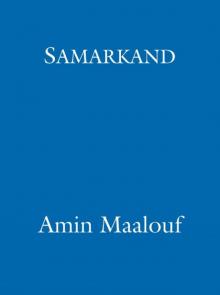 Samarkand
Samarkand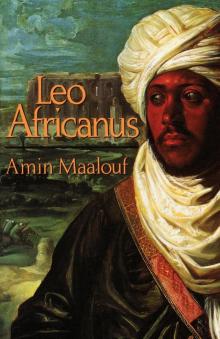 Leo Africanus
Leo Africanus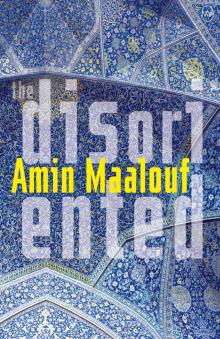 The Disoriented
The Disoriented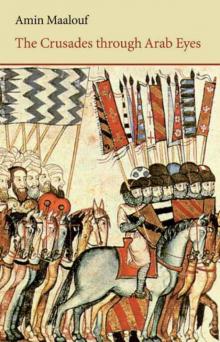 The Crusades Through Arab Eyes
The Crusades Through Arab Eyes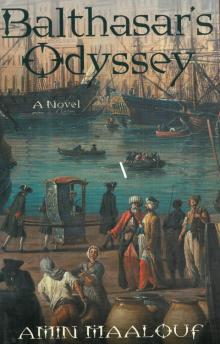 Balthasar's Odyssey
Balthasar's Odyssey